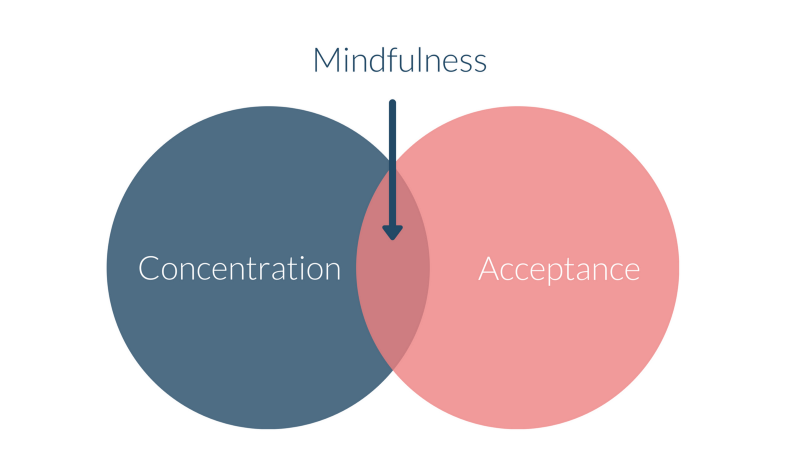Why Meditating With Anxiety Is So Hard

The benefits of practicing mindfulness are widely known and well researched. And a range of studies show that it can be an effective tool for people who struggle with stress and anxiety. That’s why more and more people want to give it a try; many of them even try to meditate regularly. But even though practicing mindfulness is quite simple, it’s not easy. Because learning to meditate when you struggle with anxiety is hard.
How Mindfulness And Anxiety Relate To Each Other
Mindfulness means becoming aware of thoughts and feelings without wanting them to be different. Everyone who meditates regularly knows all too well that this can sometimes be easy and at other times seemingly impossible.
It’s true that mindfulness practices can help greatly when uncomfortable thoughts and feelings come up. But when our mind is racing or we experience really uncomfortable sensations in our body, it can feel impossible to just ‘stay with the feeling’ or ‘let go of thoughts’. And the more intense the feelings are the harder it is to ‘just experience them without reacting’. As a result, we can end up feeling like mindfulness isn’t working for us.
Spotlight On Acceptance
To understand what we can do about this, let’s take one quick step back. When people get started with practicing meditation, it’s usually by focusing on the breath. That’s important because it helps us stabilize our minds which is the foundation for any kind of meditation. The better we’re able to control our attention the better we become at managing our thoughts and emotions.
But understanding mindfulness meditation only as a concentration technique misses an important piece: Mindfulness also requires acceptance:

Practicing non-judgmental awareness on the present moment means openly accepting whatever we experience. But accepting negative thoughts and feelings when they are intense and maybe even overwhelming can be darned hard. And that’s exactly why meditating with anxiety is so hard.
(A note for those who notice a paradox here: You start to practice mindfulness meditation to get rid of anxiety but now you’re asked to be open and curious about it? How is that supposed to work? The truth is that this is not really a paradox. The key is that acceptance comes first, and change comes later. We first need to accept things and then they change by themselves. And they become much more manageable once we truly accept them. Seems counter-intuitive but it’s true. If you want to know more, check this out.)
So What Can We Do About It?
First and foremost, it’s important to understand that mindfulness is a skill that needs practice. Most people who expect revolutionary changes in a few days or weeks will end up disappointed. Change happens gradually; it takes time.
The second important step is to stop fighting. That’s much easier said than done but it’s crucial. Uncomfortable knot in the stomach? It’s just a feeling, it can’t harm you. Racing heart? Same thing. Racing thoughts? Accept that your mind is racing right now.
If you do that, the thoughts will continue to race but you are now practicing acceptance. A couple of seconds later, you will follow a negative thought and start worrying or ruminating. And only after a minute or two you’ll notice that you drifted off. In that moment, you become aware of your thoughts again and that’s your next chance to bring acceptance to those thoughts.
The same is true for unpleasant feelings. Sometimes, the feelings will seem unbearable and you’ll try to numb them by watching tv, eating, shopping, drinking, smoking, or [insert your favourite strategy here]. As you practice acceptance, you’ll gradually learn that those feelings aren’t dangerous. They aren’t even as uncomfortable as you first think they are.
But they aren’t pleasant either and they sometimes linger for a long time. That’s where the third and final piece of advice comes in: A good strategy for those who learn meditating with anxiety is to use short mantras of mindfulness and self-compassion. Most of us easily go into self-deprecating mode when we feel bad but this is just another form of fighting our thoughts and feelings. To move away from harsh self-criticism and accept your current experience, these mantras can help:
“This too shall pass.”
“This is hard but I can stay with this feeling.”
“This is a moment of suffering; suffering is a part of life; may I be kind to myself and give myself what I need.”
If those don’t resonate with you, it’s of course possible to come up with your own. It can take a bit of trying to find what works best before you settle on one. Once you feel comfortable with your mantra, use it when you notice that you’re all tangled up in anxious thoughts and feelings.
Summing Up
If you’re thinking about giving mindfulness meditation a fresh try, keep these three tips in mind: Change happens gradually. Mindfulness doesn’t have to feel pleasant. And mantras can serve as great reminders when we feel bad. If you follow these three pieces of advice, you’ll gradually learn to reap the benefits that mindfulness has to offer.
Learn to manage anxiety in only 5 minutes per day
